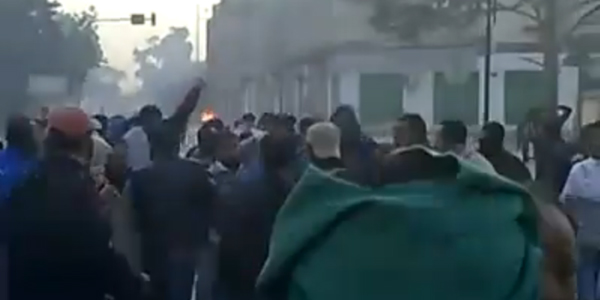In Libyan Protests, Both Sides Escalate Violence
As protesters across the region follow the Egyptian and Tunisian model of nonviolent occupation, Libya inches down a darker path

Late on Saturday, minutes after Libyan protesters seized the internal security headquarters in Benghazi, the country's second largest city and a focal point of anti-government demonstrations, Al Jazeera English broadcast a live telephone call between its anchor and a man in Benghazi. Security forces in the building, besieged by protesters furious over the crackdown that had killed 84 people in only three days, had taken to firing live rounds into the crowd. The Al Jazeera host asked if protesters planned to kill any government men they found in the building. The man on the phone, a doctor, replied without pause, "Yes, of course."
By the time that Libya's sixth day of protests came to a close on Saturday, parts of eastern Libya, where the government has less control and where Benghazi is located, had disintegrated into some of the fiercest and most savage fighting since popular Arab demonstrations began in Tunisia nearly two months ago. Fragmentary reports paint an incomplete but disturbing picture of open and bloody battle between protesters and security forces, which are aided by foreign fighters believed to be mercenaries from Sub-Saharan Africa.
Because of the country's severe media restrictions, information out of Libya is extremely difficult to verify. Protesters send reports to Libyan exile groups or to open-source organizers such as Shabab Libya, which then filter through to social or traditional media. On Saturday, Switzerland-based exile groups told Reuters that protesters had completely seized Bayda, also located in the east. In the broken, urgent English common to such dispatches, Shabab Libya reported on Twitter, "Now breaking from #bayda they fought and beat the mercenaries and hanged them in the valleys surrounding bayda. now %100 secure." Reuters later added that government forces were attempting to retake the town.
Even by the mildest and most reliable accounts out of Libya, the uprising there has been far more violent than any of those across North Africa and the Middle East. Other such demonstrations have emphasized nonviolent occupation, with protesters seizing a central location such as Cairo's Tahrir Square and holding it against government attempts to disperse them. Libyan protesters began as the others, gathering peacefully in city centers. But over the past week, perhaps in response to the brutal and often fatal government response, the demonstrators have gone from enduring the crackdown to actively fighting back. Matching aggression with aggression, and likely fearing for their lives if they fail, the enraged protesters of Benghazi and elsewhere are attacking security forces and buildings. It's not that Libya's protesters are especially violent; the severity of Qaddafi's crackdown has forced them to choose between going on the offensive or accepting annihilation.
For now, it's impossible to know for sure whether protesters really did secure Libya's third-largest city, whether the lush Mediterranean hills outside the city are punctuated with the hanging bodies of security forces, or whether government militias launched a counter-assault that may still be ongoing. But such claims are in line with a pattern of jarringly violent reports out of Libya. Security forces opened fire on a funeral procession in Benghazi, Al Jazeera reports, killing at least 15 mourners. According to BBC News, army snipers are firing indiscriminately at protesters. Libyan social media outlets, which have been several hours ahead of traditional media but may be prone to exaggeration, carry several shocking reports: that protesters have set fire to government buildings in the western city of Yifran, that security forces are raining mortars on civilians in Benghazi, that children are among the dead.
Libyan autocrat Muammar al-Qaddafi, despite recent gestures toward liberalization, still exercises a firmer hand and greater willingness to kill his own people than either of his now-deposed neighbors, Tunisian President Zine El Abidine Ben Ali or Egyptian President Hosni Mubarak. As Qaddafi cracks down, the protesters in Libya's east appear willing to escalate in turn. There is no telling whether the ongoing fighting will be more or less likely to topple the regime than were the mass sit-ins of Egypt and Tunisia, or whether the protesters, as they become more isolated and violent, will coalesce into just another opposition militia in a part of the world that already has plenty. In a worst-case scenario, eastern Libya moves not toward peaceful regime change but low-level civil war. The nonviolent demonstrations elsewhere in the Arab world have produced many heroes and martyrs, but war has no innocents.
Image: Still from a YouTube video purporting to show protests -- and the killing of a protester by security forces -- in Benghazi on Saturday